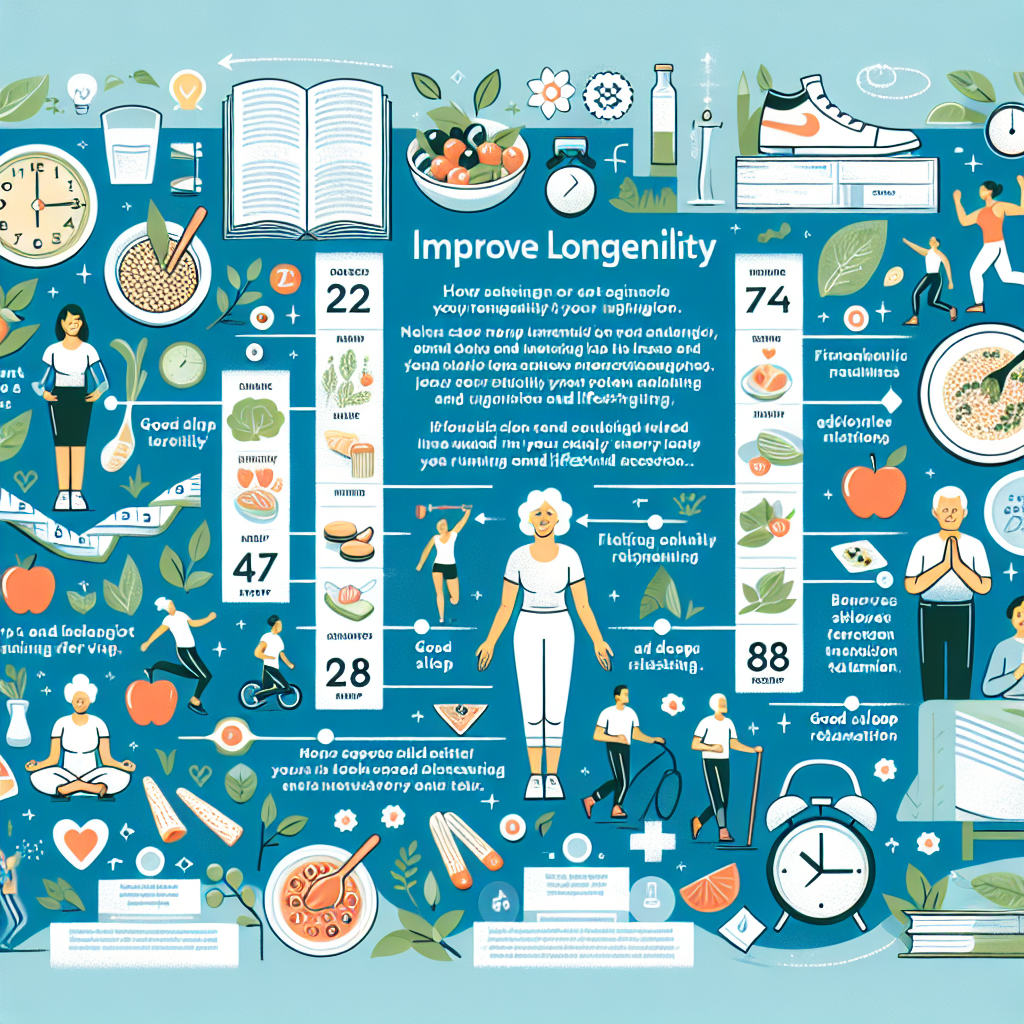How to Improve Longevity Through Nutrition and Lifestyle

Discover the secrets to improving longevity through nutrition and lifestyle! Learn how to make simple changes that can have a profound impact on your health and lifespan. Don’t wait, start your journey to a healthier, longer life today. Click here to get started.
Maximizing Lifespan: Nutritional Choices for Enhanced Longevity
The quest for longevity has been a constant pursuit throughout human history. Today, we understand that the key to a long and healthy life lies not in mythical fountains of youth, but in the choices we make every day regarding our nutrition and lifestyle. By making informed decisions about what we eat and how we live, we can significantly enhance our lifespan and improve our quality of life.
Nutrition plays a pivotal role in our overall health and longevity. A balanced diet rich in fruits, vegetables, lean proteins, and whole grains can provide our bodies with the essential nutrients they need to function optimally. These foods are packed with vitamins, minerals, and antioxidants that help protect our cells from damage, reduce inflammation, and boost our immune system.
One of the most effective dietary approaches for longevity is the Mediterranean diet. This diet, which is high in fruits, vegetables, whole grains, and healthy fats like olive oil, has been linked to a lower risk of heart disease, cancer, and other chronic diseases. The Mediterranean diet also emphasizes the consumption of fish, which is rich in omega-3 fatty acids. These healthy fats have been shown to reduce inflammation and promote heart health, further contributing to longevity.
In addition to a healthy diet, regular physical activity is crucial for longevity. Exercise not only helps maintain a healthy weight, but it also strengthens the heart, improves circulation, and boosts mental health. Even moderate activities like walking or gardening can have significant health benefits if done regularly.
Moreover, maintaining a healthy weight is another key factor in promoting longevity. Obesity is linked to a host of health problems, including heart disease, diabetes, and certain types of cancer. By eating a balanced diet and staying active, we can help keep our weight in check and reduce our risk of these serious diseases.
Lifestyle choices also play a significant role in longevity. Avoiding harmful habits like smoking and excessive alcohol consumption can add years to our lives. Smoking, in particular, is one of the leading causes of premature death, as it damages nearly every organ in the body. On the other hand, moderate alcohol consumption, particularly of red wine, has been linked to a longer lifespan. However, it’s important to note that excessive drinking can have the opposite effect, leading to a host of health problems.
Getting enough sleep is another crucial aspect of a longevity-enhancing lifestyle. Sleep is when our bodies repair and rejuvenate themselves, and chronic sleep deprivation has been linked to a host of health problems, including heart disease, diabetes, and obesity. Most adults need between seven and nine hours of sleep per night for optimal health.
Lastly, managing stress effectively can also contribute to a longer, healthier life. Chronic stress can lead to a host of health problems, including heart disease, depression, and a weakened immune system. Techniques such as meditation, yoga, and deep breathing can help manage stress levels and promote overall well-being.
In conclusion, the path to longevity is not a secret or a mystery. It’s a journey that involves making informed choices about our diet and lifestyle. By eating a balanced diet, staying active, maintaining a healthy weight, getting enough sleep, and managing stress, we can significantly enhance our lifespan and improve our quality of life. It’s never too late to start making these changes, and the benefits are well worth the effort.
Lifestyle Modifications for a Longer, Healthier Life

The quest for longevity has been a constant pursuit throughout human history. Today, we understand that the key to a longer, healthier life lies not in a mythical fountain of youth, but in the choices we make every day. Among these, nutrition and lifestyle modifications stand out as the most influential factors.
Nutrition plays a pivotal role in our health and longevity. A balanced diet, rich in fruits, vegetables, lean proteins, and whole grains, provides the body with the necessary nutrients to function optimally. These foods are packed with vitamins, minerals, and antioxidants that help to combat oxidative stress, a major contributor to aging and disease. Moreover, a diet low in processed foods and saturated fats can help to maintain a healthy weight and reduce the risk of chronic diseases such as heart disease and diabetes.
In addition to a healthy diet, hydration is also crucial for longevity. Water aids in digestion, nutrient absorption, and the elimination of waste products from the body. It also helps to maintain healthy skin, which is the body’s first line of defense against environmental toxins.
However, nutrition is just one piece of the puzzle. Lifestyle modifications are equally important in promoting longevity. Regular physical activity, for instance, has been shown to extend lifespan by reducing the risk of chronic diseases and improving mental health. Exercise boosts cardiovascular health, strengthens the immune system, and promotes better sleep, all of which are essential for a long, healthy life.
Furthermore, stress management is a critical aspect of a longevity-promoting lifestyle. Chronic stress can lead to a host of health problems, including heart disease, diabetes, and depression. Therefore, incorporating stress-reducing activities such as meditation, yoga, or simply spending time in nature, can significantly improve health and longevity.
Sleep is another often overlooked but vital component of a healthy lifestyle. Adequate sleep is necessary for the body to repair and regenerate cells, consolidate memory, and regulate hormones. Lack of sleep has been linked to a variety of health problems, including obesity, diabetes, and cardiovascular disease. Therefore, ensuring a good night’s sleep should be a priority for anyone seeking to improve their longevity.
Lastly, social connections and a sense of purpose have been shown to contribute to longevity. Studies have found that individuals with strong social networks and a sense of purpose in life tend to live longer than those without. This may be due to the positive effects of social interaction and purpose on mental health, stress levels, and overall well-being.
In conclusion, longevity is not a matter of chance, but a result of conscious choices and habits. A balanced diet, regular physical activity, stress management, adequate sleep, and strong social connections are all integral components of a lifestyle that promotes longevity. By making these simple modifications, we can significantly improve our chances of living a longer, healthier life. It’s never too late to start making these changes. After all, the journey to longevity is a marathon, not a sprint.
The Role of Nutrition and Lifestyle in Promoting Longevity
Longevity, the length or duration of life, is a topic that has fascinated humans for centuries. While genetics play a significant role in determining our lifespan, research has shown that our daily habits, particularly our nutrition and lifestyle, can significantly influence our longevity.
Nutrition is a critical factor in promoting longevity. A balanced diet, rich in fruits, vegetables, lean proteins, and whole grains, can help prevent chronic diseases such as heart disease, diabetes, and cancer, which are among the leading causes of death worldwide. These foods are packed with essential nutrients, including vitamins, minerals, and antioxidants, which help protect our cells from damage and support our immune system.
Moreover, certain dietary patterns have been associated with longer lifespans. For instance, the Mediterranean diet, characterized by high consumption of fruits, vegetables, whole grains, and olive oil, and moderate consumption of fish and wine, has been linked to lower rates of heart disease and longer lifespans. Similarly, the traditional Japanese diet, which is low in saturated fats and high in fish, soy, and plant foods, has been associated with one of the highest life expectancies in the world.
However, it’s not just about what we eat, but also how much we eat. Overeating can lead to obesity, which is a risk factor for many chronic diseases. On the other hand, research has shown that calorie restriction, without malnutrition, can extend lifespan in various species, possibly by reducing metabolic rate and oxidative stress. While more research is needed in humans, these findings suggest that maintaining a healthy weight through a balanced diet could contribute to longevity.
In addition to nutrition, lifestyle plays a crucial role in promoting longevity. Regular physical activity is one of the most effective ways to extend our lifespan. Exercise helps maintain a healthy weight, strengthens the heart and lungs, improves mental health, and reduces the risk of chronic diseases. The World Health Organization recommends at least 150 minutes of moderate-intensity or 75 minutes of vigorous-intensity physical activity per week for adults.
Furthermore, adequate sleep is essential for our health and longevity. Sleep deprivation has been linked to various health problems, including obesity, diabetes, cardiovascular disease, and even premature death. Most adults need between seven and nine hours of sleep per night for optimal health.
Lastly, stress management is another key aspect of a longevity-promoting lifestyle. Chronic stress can lead to various health problems, including heart disease, depression, and a weakened immune system. Therefore, incorporating stress-reducing activities, such as meditation, yoga, or simply spending time in nature, into our daily routine can contribute to a longer, healthier life.
In conclusion, while we cannot control our genetics, we have significant control over our nutrition and lifestyle, which can greatly influence our longevity. A balanced diet, regular physical activity, adequate sleep, and stress management are all crucial for promoting longevity. By making small, consistent changes in these areas, we can potentially add years to our life and, more importantly, life to our years.